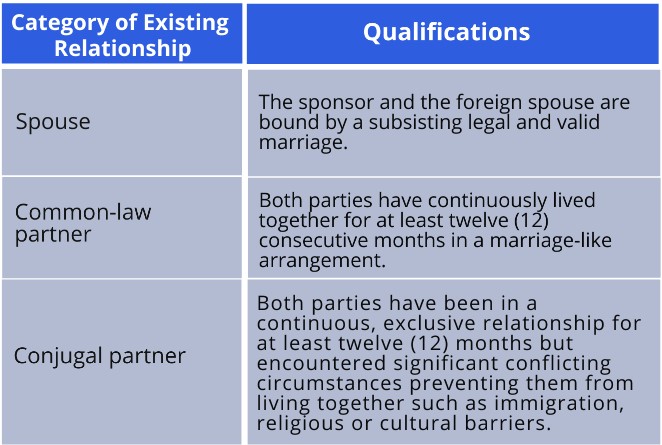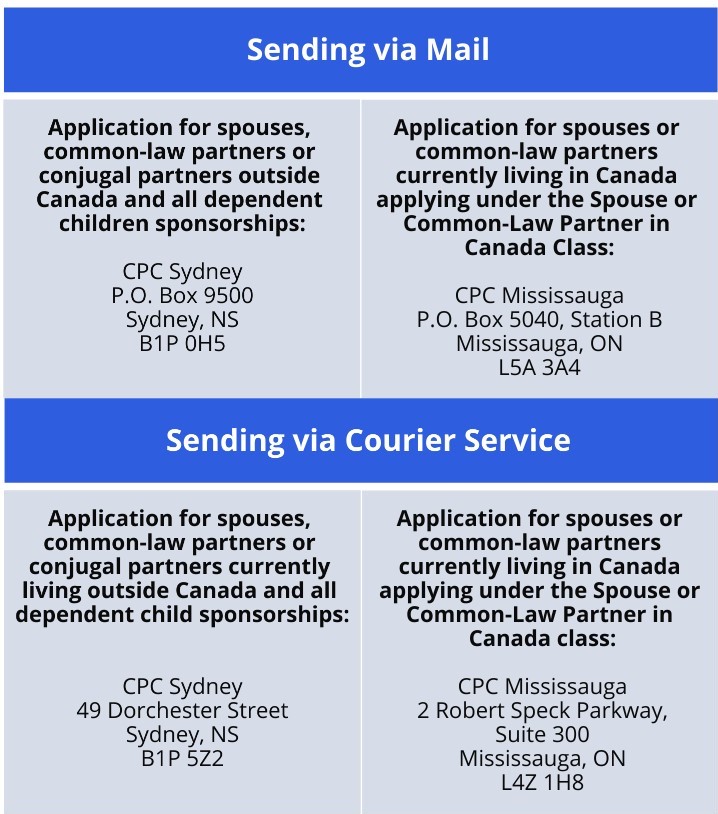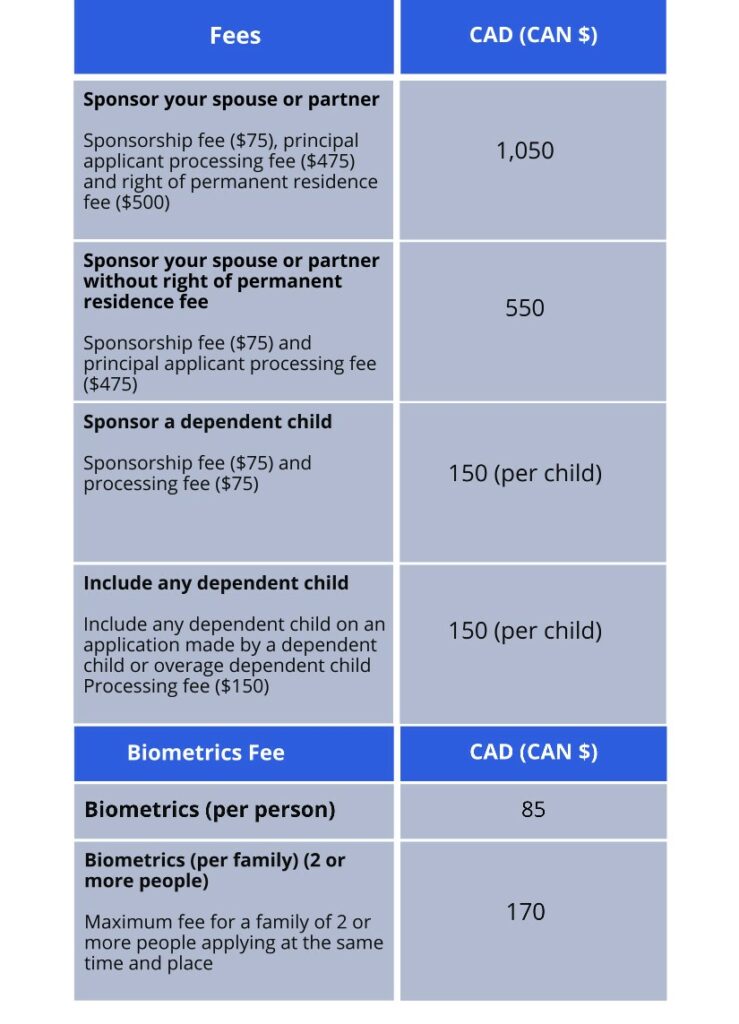
Spousal sponsorship is a type of family immigration application process wherein a Canadian citizen or permanent resident sponsors his or her foreign spouse, common-law partner or conjugal partner to come and live permanently in Canada.
As to who can be subject to this kind of sponsorship, the scope is no longer confined to just the legal husband or the wife. One can receive a residence under this family immigration program as long as the sponsor and the foreign spouse or partner can prove the authenticity of their marriage or an existing common-law or conjugal relationship.
There are two (2) main options to choose from when it comes to Spousal Sponsorship, namely:
There are two (2) parts to the preparation of an application package for Spousal Sponsorship:
Note: Both of these steps are performed and accomplished simultaneously. Submission of all applications are coursed to the Immigration, Refugees and Citizenship Canada (IRCC) for approval. The IRCC is the approving authority for immigration applications in general.
A general overview of steps in sponsoring one’s spouse is enumerated as follows:
Note: Remember to include the payment receipts to your application package before submitting it; otherwise, your application will not be processed.
Canadian Sponsors and sponsored foreign spouses can check the status of their spousal sponsorship application online, once the application has passed the eligibility checks and was given a file number.
To be eligible as a Sponsor, you:
Note: “Basic Needs” include:
Note: One must already have a permanent resident status at the time of the submission of the sponsorship application.
If the sponsor is a Canadian citizen living outside of Canada, additional evidence is required. For example, they declare intent to reside in Canada and to some extent, show a detailed plan to live in Canada the moment the sponsored foreign spouse becomes a permanent resident**.
Note*: The sponsor is still bound by the three (3)-year undertaking to take care of the sponsored spouse or partner.
Note**: A permanent resident living outside Canada cannot be a sponsor.
The Sponsored Foreign Spouse, Common-Law Partner or Conjugal Partner can be either sex and must be:

Opposite and same-gender marriages are recognized for immigration purposes if they legally took place in Canada. In case the marriage happened outside of Canada, the marriage must both be legally recognized in the country where the ceremony took place and in Canada. The IRCC no longer recognizes marriages performed outside of Canada by way of proxy, telephone, fax, internet, and any other form of marriage where one or both parties were not physically present at the actual ceremony.
One cannot sponsor a foreign spouse who is considered inadmissible in Canada. In other words, the sponsored foreign spouse must pass all the requisite background, security, and medical checks for the spousal sponsorship application to be approved.
A person can be found inadmissible for different and various reasons such as:
Some of the inadmissibilities can be potentially surpassed. Contact Konan Law for more information about this.
An undertaking must be signed the moment one agrees to be a sponsor. This undertaking expresses the responsibility and commitment of the sponsor to give financial support for the basic needs of the sponsored foreign spouse and their dependent children, if there are any.
It is important that prior to the signing of the undertaking agreement, the Canadian sponsor must make sure that the foreign spouse to be sponsored will not be needing to ask the government for financial assistance. Once they receive social assistance, the sponsor will have to reimburse the government for all the expenses covered and disbursed to the foreign spouse (and the dependent children, if any) during the time that said sponsor is supposed to be the one legally responsible for doing such.
The undertaking is a binding commitment to support the applicant(s) during its entire duration regardless of any changes in the sponsor’s given circumstances and situation. In other words, the undertaking will remain in effect and will not be cancelled for the length of the undertaking period even if situations change. Example of changes in situations are:
Should the Canadian sponsor change his or her decision after the submission of the sponsorship application and undertaking, a letter expressing such decision must be written and sent to the IRCC before a final decision is made on the file.
The letter can be submitted as an attachment through the IRCC Webform or it can also be sent to the following address as may be appropriate:

Note: An undertaking can only be withdrawn upon IRCC’s approval.
The moment the undertaking takes effect, one’s obligations as a sponsor likewise commences. In cases of spousal sponsorship, the length of undertaking is three (3) years reckoned from the day the sponsored foreign spouse, common-law partner or conjugal partner becomes a permanent resident.
Most of the time, no income requirement is required to be able to sponsor one’s spouse. Specifically, there is no low-income-cut-off (LICO) for spousal sponsorship. However, a minimum LICO score must be met if the sponsored foreign spouse or partner has a dependent child who also has dependent children of their own. Such minimum LICO score is determined by the Canadian government each year.
If LICO requirements must be met, a Financial Evaluation form (IMM 1283) is needed to be filled out and attached together with the spousal application.
The complete checklist of requirements and guidelines can be found here.
The Table of Fees provided below can be used as a reference as to how much it costs to sponsor a foreign spouse, common-law partner or conjugal partner.

As there are two ways to sponsor one’s spouse: in Canada and outside of Canada, applicability depends on the circumstances of the case:
Outside of Canada is applicable if:
In Canada applies when:
Note: Under these circumstances, the sponsored spouse can apply for an Open Work Permit while the application is pending.
For individuals applying for spousal sponsorship, immigration officers shall be conducting background checks. Any or all of the following may be offered as proof to establish a spousal, common-law or conjugal relationship:
And some of the following documents, but not limited to, depending on the circumstances:
In general, sponsorship applications take twelve (12) months of processing time once it has passed eligibility checks. These can take longer depending on a case-to-case basis. For example, in cases where the immigration office requires additional proof of spousal relationship or any additional documents, the application process will be delayed.
Spousal Sponsorship shall be disapproved when:
Five (5)-year bar in an application for spousal sponsorship
Sponsorship bar for violent crime(s)
People who have been convicted of violent crimes shall be barred from sponsoring one’s spouse.
Under normal circumstances, one needs to give biometrics within thirty (30) days if he or she is applying for a permanent residence in Canada. However, due to the COVID-19 pandemic, temporary measures have been implemented. Deadlines are reasonably extended to ninety (90) days and in cases where the closest biometrics collection sites are closed can be extended even further.
If the applicant was able to give their biometrics for another application within the last ten (10) years, there is no need to give biometrics again.
If no previous biometrics were given in the past or the last biometrics were given longer than ten (10) years ago, one must give them as soon as the closest biometrics collection sites are operating again.
In some instances, an interview is needed. If this is the case, the IRCC will inform the applicant and provide the details for the interview such as the date, time, location and the list of documents to bring.
Questions to be asked during an interview may vary depending on the need. Questioning may include personal circumstances as well as the applicant’s means to comfortably settle down in Canada.
If one is applying for permanent residence in Canada, it is imperative that he or she undergoes an immigration medical exam. Immediate family members, even if they will not be accompanying the applicants, also need to undergo medical exam.
Upon arriving at the medical exam appointment, all fees related to the medical exam must be paid, including doctor’s fee, fees for any special tests, investigations or treatment as well as any other specialists’ fees as may be necessary. Note: Fees paid for medical exams are non-refundable.
The validity of medical exam results is only for a span of twelve (12) months. If the applicant will not be able to come to Canada as a permanent resident within that timeframe, he or she may need to undergo another medical exam.
Some panel physician offices may be closed due to the prevailing conditions associated with the COVID-19 pandemic. It is therefore advisable to contact the panel physician’s office first so as to ensure and verify the medical exam appointment. Prior scheduling of an Immigration Medical Examination (IME) is likewise recommended.
If an application is in progress, it will not be denied or closed for not being able to complete said IME on time because of COVID-19 related reasons. An automatic 90-days extension will be granted to the applicant.
COVID-19 also causes major mailing delays. To compensate, the IRCC will now be returning incomplete applications via e-mail if a digital copy is made. Otherwise, it will be sent back via mail.
